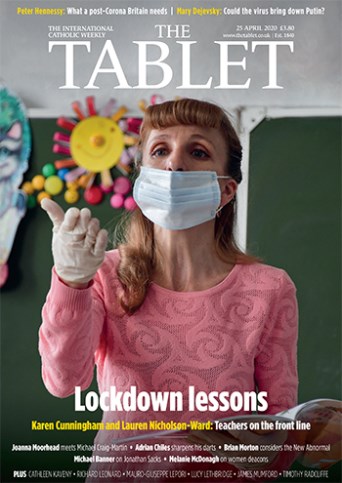Lockdown lessons
Though suffused in tragedy and hardship, Peter Hennessy sees the corona experience as a rediscovery of our better selves: the challenge now, he says, is to turn this into policy and practice. As our leader this week points out, the crude blame game only distracts energy from the task in hand: how best to defeat the virus and to turn the creativity and resourcefulness we are seeing into something just and durable.
In seven pages of news from Britain, Ireland and the world, Ellen Teague and Sarah Mac Donald have been speaking to hospital chaplains who have been ministering to the sick and dying, and Liz Dodd reports on the differences beginning to emerge between the bishops on church closures. Bishop Egan of Portsmouth is encouraging Catholics to visit their parish church “in order to touch it – wipe it clean afterwards”. The risks are clear; particularly for the old and the most vulnerable. In our second leader, we argue that even as we approach the time when the obligatory closure of churches will be lifted, it would be an act of charity not to travel to visit them.
Cardinal George Pell has no personal animus against Pope Francis, but has been a leading critic of his reform programme. In View from Rome, Christopher Lamb wonders if his release from prison will see him return to active duty in the culture wars. James Roberts writes that Pope Francis has been warning that as the world slowly recovers from the pandemic there is a risk it will be struck by an even worse virus – that of selfish indifference; Christopher Lamb reports that Cardinal Walter Kasper is seeing the pandemic as a fresh spur to church reform while the new president of Germany’s bishops’ conference has endorsed the blessing of faithful same-sex relationships. Jonathan Luxmoore reports on how Orthodox Christians across Europe celebrated Easter under lockdown.
In an education special, we focus on the teachers who are in the front line. Karen Cunningham describes how the closure of schools has dramatically changed the lives of the children, staff and parents of a Catholic primary in one of London’s largest housing estates; Lauren Nicholson-Ward writes that “we have rediscovered teaching as a vocation”; and in a moving piece the moral philosopher James Mumford remembers his old English teacher, “who worked in what is au fond a profoundly sacrificial profession”.
Timothy Radcliffe remembers his friend, David Sanders OP, who died recently. Experienced Kremlin-watcher Mary Dejevsky argues that Putin’s grip on power is looser than ever before – because of the coronavirus. Mauro-Giuseppe Lepori, the leader of the Cistercian order worldwide, reflects that this time of anxiety, confinement and stillness might also be a moment of spiritual reawakening. Richard Leonard reminds us that although plagues are not sent by God to teach us a lesson, we can learn from them, and Cathleen Kaveny sees this as a moment of darkness that might lead to a strengthening of the bonds that bind us together. In Letters, Archbishop Emeritus Kevin McDonald hopes we might edge closer towards – rather than further away from – looking for global solutions to global problems. And while Melanie McDonagh confesses she hasn’t been doing anything useful during the lockdown like learning a foreign language or taking up needlepoint, Adrian Chiles tells us he has been polishing up his darts-throwing technique.
Michael Craig-Martin, who has designed a colour-your-own poster for the NHS (reproduced in the print edition for the diversion of children of all ages), tells Joanna Moorhead how his work has been inspired by the Catholicism of his childhood. Lucy Lethbridge has been watching some terrific stuff in recent weeks: the Danish drama about the family of a Danish pastor, Ride Upon the Storm, sounds unmissable. D.J. Taylor listened to a radio documentary about religious communities in lockdown France and Brian Morton welcomes new albums from The Strokes and Fiona Apple. In Books, Michael Banner wonders if the foundations to Jonathan Sacks’ impassioned defence of morality might be shakier than he thinks; Rachel Kelly enthusiastically embraces horticultural therapy; and William Joll recommends Evie Wyld’s third novel – even if it needs a couple of goes to get the hang of it.
All these stories and features are available on our website, which is updated several times a day, and has become the place to go for links to spiritual resources: click on Isolated but not Alone for our directory of lockdown essentials. Amongst recent blogs exclusively online, Michael Carter explains the particular relevance this year of the feast of St George; Christopher Lamb discusses the importance of human kindness during the lockdown and its aftermath; and James Roberts shares his concerns about the Vatican and Beijing.
We are always being told that The Tablet is a lifeline; readers seem to be holding on to it with both hands at the moment. Like many magazines, we are experiencing a surge of traffic to our website and an increase in subscriptions. Thank you for all the messages of support, and for your loyalty.
Every good wish for Eastertide.

Brendan Walsh
Editor of The Tablet
Get Instant Access
Subscribe today to take advantage of our introductory offers and enjoy 30 days' access for just £7.99
SUBSCRIBE NOW

